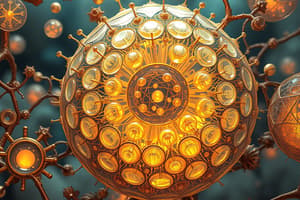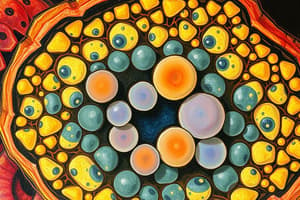Podcast
Questions and Answers
Which organelle is involved in protein synthesis and lipid synthesis?
Which organelle is involved in protein synthesis and lipid synthesis?
- Endoplasmic reticulum (correct)
- Nucleus
- Golgi apparatus
- Mitochondria
Which organelle is often referred to as the 'powerhouse' of the cell?
Which organelle is often referred to as the 'powerhouse' of the cell?
- Endoplasmic reticulum
- Nucleus
- Golgi apparatus
- Mitochondria (correct)
Which organelle contains the cell's genetic material in the form of DNA?
Which organelle contains the cell's genetic material in the form of DNA?
- Endoplasmic reticulum
- Golgi apparatus
- Mitochondria
- Nucleus (correct)
Which organelle has its own DNA and can replicate independently of the cell?
Which organelle has its own DNA and can replicate independently of the cell?
Which cell organelle is responsible for the post-translational modification of proteins and lipids?
Which cell organelle is responsible for the post-translational modification of proteins and lipids?
Which organelle is composed of two types of cisternae, the cis-Golgi network, and the trans-Golgi network?
Which organelle is composed of two types of cisternae, the cis-Golgi network, and the trans-Golgi network?
Where are ribosomes found within the cell?
Where are ribosomes found within the cell?
Which organelle forms the largest network of membranes in the cell?
Which organelle forms the largest network of membranes in the cell?
What is the primary function of mitochondria in a eukaryotic cell?
What is the primary function of mitochondria in a eukaryotic cell?
Which organelle is responsible for the storage and organization of genetic information in a cell?
Which organelle is responsible for the storage and organization of genetic information in a cell?
What characterizes prokaryotic cells in terms of organelles?
What characterizes prokaryotic cells in terms of organelles?
What distinguishes the nucleus from other cell organelles?
What distinguishes the nucleus from other cell organelles?
What is the main function of the Golgi apparatus?
What is the main function of the Golgi apparatus?
Which organelle consists of a larger 60S subunit and a smaller 40S subunit?
Which organelle consists of a larger 60S subunit and a smaller 40S subunit?
What is the primary function of the endoplasmic reticulum?
What is the primary function of the endoplasmic reticulum?
Which organelle is responsible for the synthesis of both proteins and lipids within the cell?
Which organelle is responsible for the synthesis of both proteins and lipids within the cell?
Flashcards are hidden until you start studying
Study Notes
Cell Organelles
Cells are the basic building blocks of life, and their structure and organization are crucial for their proper functioning. One of the ways cells are organized is through the presence of cell organelles, which are specialized structures with specific functions within the cell. In this article, we will discuss five major cell organelles: the Golgi apparatus, ribosomes, endoplasmic reticulum, mitochondria, and nucleus.
-
Golgi Apparatus
The Golgi apparatus, also known as the Golgi complex, plays a crucial role in post-translational modification of proteins and lipids, as well as in the sorting and transport of proteins and lipids between the endoplasmic reticulum (ER) and the plasma membrane. It is composed of two types of cisternae (flattened membrane-bound sacs): the cis-Golgi network (CGN), which receives proteins and lipids from the ER, and the trans-Golgi network (TGN), which sends proteins and lipids to their final destinations.
-
Ribosomes
Ribosomes are large, complex protein-making machines that translate the genetic code of RNA into proteins. They are composed of two subunits, one large and one small, and are present in the cytoplasm of the cell. Ribosomes are present in both prokaryotic and eukaryotic cells, but their structure and function are slightly different in each type of cell.
-
Endoplasmic Reticulum
The endoplasmic reticulum (ER) is a complex network of membranes that form the largest organelle in the cell. It is involved in protein synthesis, lipid synthesis, and the synthesis of steroid hormones. The ER is divided into two types: rough ER, which is covered in ribosomes and involved in protein synthesis, and smooth ER, which is not covered in ribosomes and is involved in lipid synthesis and other metabolic processes.
-
Mitochondria
Mitochondria are often referred to as the "powerhouse" of the cell, as they generate most of the cell's energy in the form of ATP (adenosine triphosphate). They are present in both prokaryotic and eukaryotic cells, but their structure and function are slightly different in each type of cell. Mitochondria have their own DNA and can replicate independently of the cell, which is why they are considered a separate organelle rather than a component of the ER.
-
Nucleus
The nucleus is the control center of the cell and contains the cell's genetic material in the form of DNA. It is surrounded by a double membrane and is enclosed in a protective structure called the nuclear envelope. The nucleus is involved in various cellular processes, such as DNA replication and transcription, which are essential for the proper functioning of the cell.
In conclusion, cell organelles play a vital role in the structure and function of cells. Each organelle has a specific function and contributes to the overall cellular processes. Understanding these organelles and their functions is crucial for understanding the basic biology of cells and the organisms they make up.
Studying That Suits You
Use AI to generate personalized quizzes and flashcards to suit your learning preferences.




